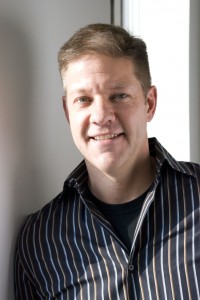Charlie Walker was only 25 when founding Vivid Resourcing, and his enthusiasm and ambitious nature have enabled him to grow the company swiftly. On course for a second-year turnover of 3.5 million, having doubled monthly profits since May 2009, Vivid aims to build their team of consultants to over twenty within the next three months. Last week I had the chance of interviewing Charlie about his entrepreneurial path and the achievements of the first 2 years:
Hi Charlie, and welcome to Entrepreneurship-interviews.com. At 25, you have given up a 150k salary to start Vivid Resourcing. What is your company about?
Charlie: We provide contract and permanent staff across a range of sectors internationally. Our focus is upon the provision of niche skills with a high level of service.
How did you identify the need for your new business?
Charlie: I’d say that client feedback was the major factor. I’m under no illusions that the recruitment market is fairly saturated with agencies. However, since the mid-90’s a perception of recruiters as either smarmy ‘headhunter’ types or pushy barrow-boys seems to have become pretty ingrained with clients we speak to. I guess that our main intention was to separate ourselves from this. We aim to train and recruit our team in a manner that allows our clients and candidates to feel that they are getting trustworthy, high-quality advice on the employment market. Our competitors often fail to secure long-term relationships, whereas this is our primary focus.
How did you decide to leave a well-paid job and start on your own?
Charlie: I felt that I needed a new challenge, to be honest. I was thrilled at my old company, but money isn’t my main motivation. I felt that I’d get a completely different sense of achievement from starting something up from scratch. I’ve really enjoyed the control I have over shaping the identity and branding of Vivid Resourcing. It has been much more difficult than I expected, in honesty, but I’m proud of what we have achieved so far.
What about the recent economic climate? Do companies still need recruitment services or do more recruitment in-house?
Charlie: I’d say that in-house recruitment is only useful for companies seeking skills that are fairly widespread on the market. We focus our attention on the high-end of various sectors (i.e., where there may be only 80-120 people available who can actually do the job). As a result, a lot of effort and nous is required to locate and supply these people within short timescales. It’s surprising how many in-house teams have contacted us this year because they struggle to find skills for their client. They might claim publicly that they cover all requirements, but it’s an open secret on the market that this model doesn’t work when requirements can’t be filled simply through advertising.
Talking about the recession, what is your turnover after the first 2 years?
Charlie: Our turnover for the financial year 2009/2010 was £3.7 million.
When you started up, did you envision such a turnover? Do you remember what your initial goals were?
Charlie: To be honest, I’m slightly disappointed with our figures to date. I think the fact that I started Vivid Resourcing only a few months before the economic downturn didn’t help matters! The fact that our growth has been 139% since our first financial year looks fantastic, but I think we are capable of much more, particularly because we have recruited some excellent staff over the past 12 months. My initial goal was to make Vivid one of the top 50 fastest growing UK businesses under 5 years. I think we are currently on target to do this.
What would you say are the main benefits of using Vivid’s services over in-house recruitment?
Charlie: I’d say response time, quality of service, and the fact that our business model is geared heavily towards providing very specialist staff. In-house recruitment teams, from my experience, can’t cut it when they are asked to supply the kind of high-end skills we recruit for.
And for people looking for a job, how can they enter your pool of professionals?
Charlie: They can contact us via our (recently relaunched) website on www.vividresourcing.com or through our central switchboard at +44 (0)20 785 7055.
How did you find your first customers when starting the business?
Charlie: Through an awful lot of cold-calling! I spent the first 4 months on my own in an office with a phone networking for 10 hours a day, establishing new contacts. Unfortunately, many of my established clients over the years weren’t recruiting heavily during 2008 due to the downturn, so it was tough going. I managed to get the company to profitability within 4 months, however, allowing me to take on our first two staff.
If you were to start all over again, what would you do differently?
Charlie: I’d probably delegate a bit more effectively, to be honest. I think when it’s your own business, it’s easy to try and control everything, and I’ve had to try and curb that tendency.
Do you provide recruitment services only to the London area or throughout the UK?
Charlie: We actually provide recruitment services internationally. Over 10% of our business last year was located outside of the UK, and this is an area in which we intend to grow rapidly.
Any outside help you used? Start-up organizations, training, chamber of commerce, etc.?
Charlie: I managed to gain initial set-up capital from a team of 3 investors who have an extremely successful track record within the recruitment market. They are very hands-off regarding day-to-day input on the business, but when I’ve needed it, their experience has been invaluable both on the financial, marketing, and back-office side of things.
What was the most important lesson you learned when going from employee to entrepreneur?
Charlie: Time management! Particularly within the recruitment industry, it is quite easy to focus your attention fairly narrowly within one’s particular market. As an MD, the factors vying for attention are pretty diverse, so I’ve had to learn to be very disciplined with my scheduling and learn to say “no” to demands on my time that aren’t worthwhile.
What are your thoughts on balancing family/personal life and being an entrepreneur?
Charlie: I think it’s difficult, in honesty. I’m lucky enough to have a very supportive partner, but it’s a challenge switching off entirely, particularly when I have access to e-mail at home! As we’ve become more established, it’s getting much easier, though- my team is now more experienced, and the managers reporting to me are performing brilliantly.
What’s next? Expanding the business, starting a new one?
Charlie: Our key focus is the rapid but sustainable growth of our London HQ, having set our aims at doubling both our turnover and sales team headcount within the next 12 months. Beyond that, plans are in place to establish an international office in central Europe by early-2012.



 Andy: Thank you. It’s a pleasure to be taking part in this interview. I’m excited to talk with you about my business venture.
Andy: Thank you. It’s a pleasure to be taking part in this interview. I’m excited to talk with you about my business venture.